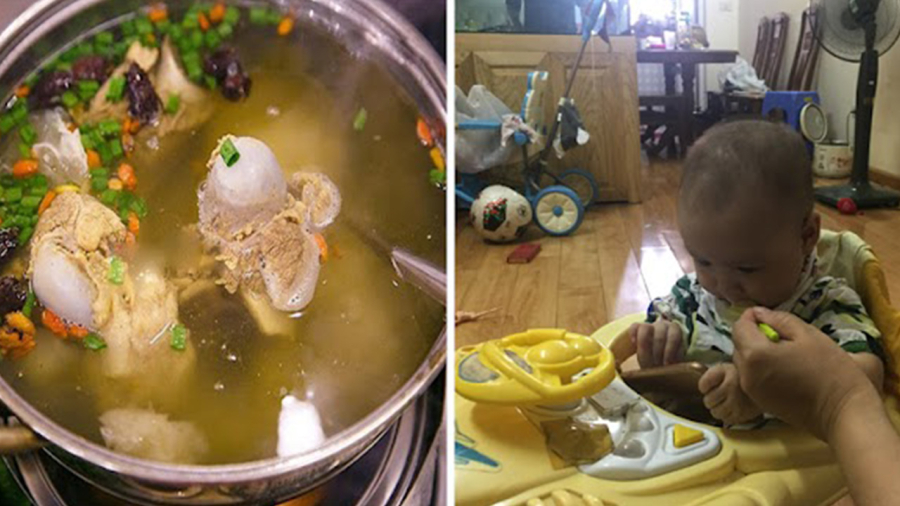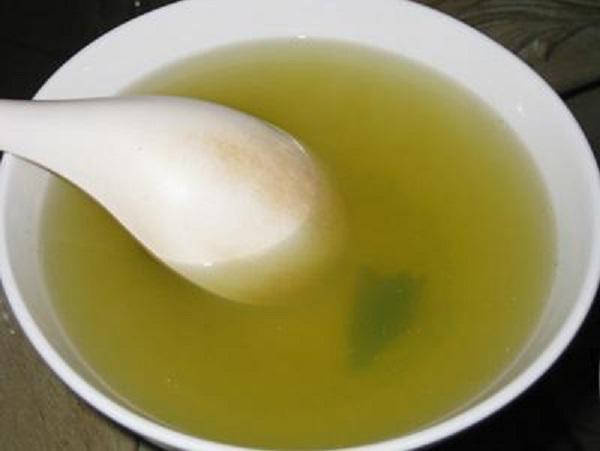3 nutrient-poor soup dishes that mothers should be aware of:
Bone soup

This is a dish that many families often use for children because they think it is nutritious, especially good for calcium and height development. However, bone soup is actually a combination of fat, meat purines, and various spices. If children consume it in large amounts, it can easily lead to obesity instead of height development.
Rice with soup poured over
According to experts, the habit of pouring soup over rice for children, although it may make them eat faster, will have some disadvantages:
+ If the same amount of meat and soup is compared, the amount of protein in the soup is only 1/10 compared to the meat. Therefore, it is better for children to eat the meat rather than the soup.
+ Eating rice with soup will reduce the chewing ability of children, affecting the shape of their teeth and speech.
+ Eating rice with soup will make children feel artificially full, which is not beneficial for nutrient absorption. In the long term, it will affect physical development and height.
Boiled vegetable water

Since most young children don’t like to eat vegetables, many mothers believe that vegetable water is as nutritious as eating vegetables, so they boil vegetables and give the water to their children to drink.
However, the basic composition of vegetable water is mostly water and very little nutrition. Moreover, during the boiling process, harmful substances on the vegetables can dissolve into the water.
3 great soup dishes to help children grow taller
Seaweed egg soup
This is a dish that is not only easy to eat but also good for the health and height development of children. This is because:
+ With eggs: According to the 2017 study by Dr. Lora Iannotti, Brown University, Washington University, St. Louis, USA, feeding children aged 6-9 months eggs daily will limit stunting compared to not providing any supplements.
+ With seaweed: It is a food that contains a lot of calcium, iron, and zinc, which can help increase children’s appetite, promote bone and teeth development, improve height, and prevent diseases such as cancer and cardiovascular diseases in young children.
Pork hock stew with white beans

This is a dish that is not only delicious but also nutritious for children for the following reasons:
+ The abundant calcium content in white beans and pork hock is good for the height development of young children.
+ Pork hock contains a lot of collagen, which is a helpful assistant in absorbing calcium. Together with calcium, it helps children’s bones stay flexible, sturdy, and resilient.
+ The fiber content in white beans also helps children effectively prevent constipation, resist bacteria, viruses, and bacteria that cause diseases in children.
+ White beans have a very high content of vitamin A, higher than cabbage and broccoli. This compound helps children reduce the risk of eye diseases such as myopia, hyperopia, and eye inflammation.
Tofu soup with fish
This is a dish that not only helps children digest easily but is also soft and appealing to eat. It is also rich in plant protein and calcium. Tofu cooked with fish not only helps children grow taller but also helps brain development, thereby increasing IQ for children.
Calcium requirements according to the age of children:
– Children from 6 – 12 months old: Need 400 mg of calcium/day. Apart from breast milk and formula milk, children need to supplement through porridge and weaning food.
– Children from 1 – 3 years old: Need about 500 mg of calcium/day. Supplement through a variety of daily foods.
– Children from 4 – 9 years old: Calcium requirements increase for bone and teeth development, while the body’s absorption ability decreases, only about 25 – 40% of the supplied calcium can be absorbed. Need to supplement about 600 – 700 mg of calcium/day.
– 10-year-old children: calcium requirements are about 1000 mg/day. At this stage, children need to supplement calcium to lay the foundation for height development and strong bone system during puberty. The amount of calcium from food is usually not enough, and children need to be provided more through supplements.
– Adolescents 11 – 24 years old: Need about 1200 mg of calcium/day to support strong development in height and bone system. In addition to food, children also need to supplement calcium in other forms.
Note that at any stage, supplementing calcium for children should be combined with outdoor activities, allowing children to be exposed to sunlight to support the best bone development.
The best time of the day to supplement calcium
According to nutrition experts, the morning is the best time of the day to supplement calcium for children.
This is the time when children need to provide energy for the whole day, and it is also the best time for children to be exposed to sunlight to synthesize vitamin D.
In addition, when supplementing calcium in the morning, children will be active throughout the day, which helps improve calcium absorption, and the amount of calcium consumed has enough time for efficient conversion into bone structure.
Parents should give children calcium supplements after breakfast for about 30 – 60 minutes, and also encourage children to drink plenty of water throughout the day to maximize calcium absorption.
It is not advisable to give children calcium supplements at night, as it can cause deposits due to poor metabolism, leading to digestive problems, kidney problems, and affecting children’s sleep.





































